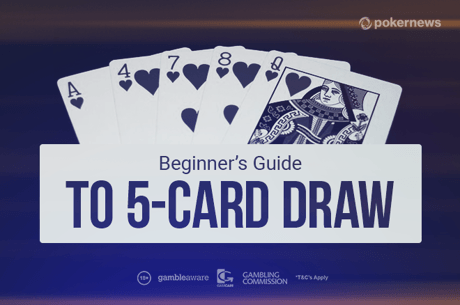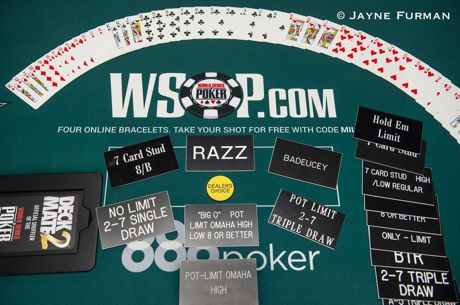Talking HORSE with Lou Krieger, Vol. 8: Omaha/8 Starting Hands, Part 2

The first episode of this short, two-part exploration of hands you ought to consider playing during the Omaha/8 orbit of a HORSE game offered some concrete suggestions for playable starting hands.
It was a pretty simple checklist, with only six items to learn. It’s a small list to be sure, but a powerful one. In fact, if you follow these guidelines while learning nothing else about Omaha/8, you still ought to be able to hold your own against typical or average Omaha/8 players. And in games where your opponents always seem to find a starting hand regardless of the four cards they’ve been dealt, you’ll be way ahead of them, unlikely to find yourself lost in a hand or confused about what to do after the flop, and more than likely to come away a long-term winner during the Omaha/8 orbit of a HORSE game.
When playing four prime cards — aces, deuces, treys, fours, and fives — without a raise in front of you, the closer you are to the button, the more valuable the hand becomes. Acting last is an advantage because you have a lot more information about the real or purported strength of your opponents’ hands than you would in early position, and you’ll also know how many opponents are in the pot with you.
In the last installment, the sixth and final group of hands that you should consider playing involved any four prime cards. I said you could play any four prime cards, even those without an ace in your hand, as long as no one has raised in front of you. The best hand in this situation would be 5-4-3-2 double-suited. The worst would be 5-5-4-4 of mixed suits.
But let’s qualify that. If you are in first position, immediately to the left of the blinds, you probably should not play this hand even though it meets these suggested requirements. But if you feel you must, make sure you are in a very loose passive game with plenty of callers before the flop and very little raising regardless of what your opponents might be holding. As you move closer to the button and the pot has not been raised, a hand with any four prime cards becomes more and more playable.
So far every recommended hand has had an ace in it, with the exception of four prime cards without an ace, but there’s another hand cluster without an ace that you can play too.
Play any hand that totals 40 points. Count aces as 11 points; take deuces through nine at face value, while tens and picture cards are all ten-point cards. You can play any 40-point hand. Hands like K-Q-J-10 or Q-Q-J-10 play particularly well in situations where a lot of people have come in before you.
Many of your opponents will play any hand with an ace in it, especially if that ace is suited. A large number of opponents entering the pot often indicates that they hold low cards. In fact, low hands dominate this — and probably everyone else’s — recommended list of Omaha/8 starting hands. But it’s this penchant for low hands that makes 40-point hands so very playable. With a lot of callers in front of you, most of the low cards are probably in your opponents’ hands, and the deck figures to be rich in high cards.
If five players have already come into the pot and the blinds haven't had an opportunity to act, that's an indication that most players hold low cards. If you’re holding high cards, your hand is very valuable. You can even raise in this situation — whether or not you have an ace — because the chance of hitting the flop is quite good. If the flop misses you, it's a very easy hand to get away from. But if you get lucky and catch a big hand you stand a very good chance of scooping the entire pot.
From the button or the cutoff seat — the seat immediately to the right of the button — anytime there are already four or more players in the pot and it’s been raised, you can even reraise with a 40-point hand. After all, when most players raise, it’s as though they are announcing that they have an ace in their hand combined with another ace or other low cards. Three of the aces are probably accounted for in situations like these, and if somebody cold-calls that raise, all four aces are probably out.
Under these circumstances, your high hand may scoop a big pot. It's unlikely to be a split pot because there probably won’t be a low hand. In any event, it’s worth a raise, or even a reraise, and if the flop misses you entirely, you’ll never be in jeopardy because your hand is very easy to release when confronted with a flop full of low cards.
These recommend hands are not the only hands you can play before the flop, but while you are learning the game there is safety in knowing you won't be seduced into playing too many hands — and playing too many hands is the downfall of more Omaha/8 players than any other single flaw. Releasing hands that do not catch part of the flop will be easy and less costly too. And when you do play, the quality of your hands will be quite high. Since most people play Omaha because it offers an easy rationale for playing more hands, these recommendations will allow you to take advantage of that propensity in your opponents and profit from it.
# # #
Lou Krieger is the editor of Poker Player Newspaper. He’s the author of more than 400 articles on poker strategy and 11 books on poker. He can also be heard on the internet radio show, “Keep Flopping Aces” which airs Thursday night at 9 p.m. Eastern Time (6 p.m. Pacific) on www.roundersradio.com.









